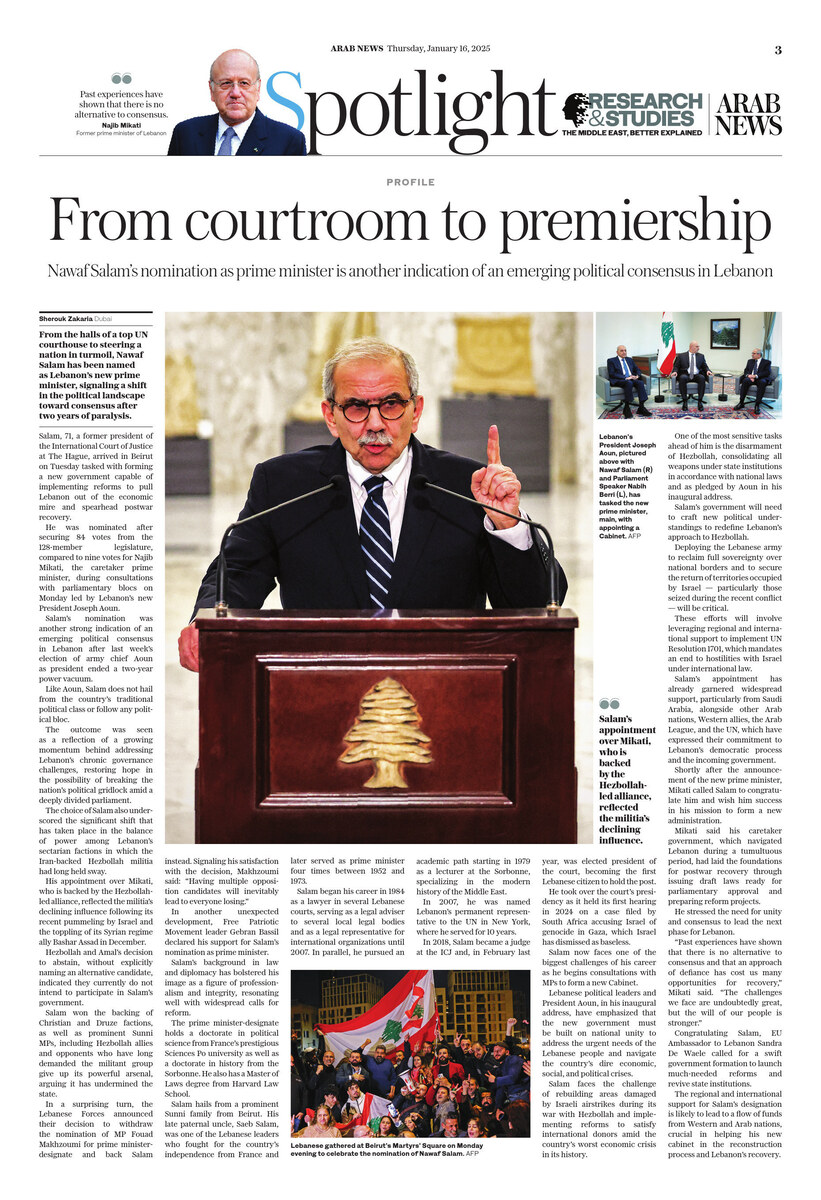DUBAI: From the halls of a top UN courthouse to steering a nation in turmoil, Nawaf Salam has been named as Lebanon’s new prime minister, signaling a shift in the political landscape toward consensus after two years of paralysis.
Salam, 71, a former president of the International Court of Justice at The Hague, arrived in Beirut on Tuesday tasked with forming a new government capable of implementing reforms to pull Lebanon out of the economic mire and spearhead postwar recovery.
He was nominated after securing 84 votes from the 128-member legislature, compared to nine votes for Najib Mikati, the caretaker prime minister, during consultations with parliamentary blocs on Monday led by Lebanon’s new President Joseph Aoun.
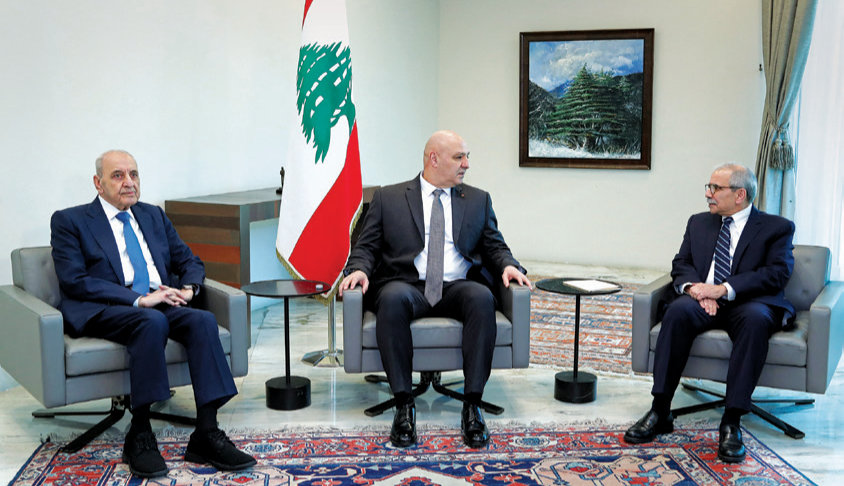
Lebanon's new President Joseph Aoun (C) and Parliament Speaker Nabih Berri (L) meeting with the new prime minister-designate Nawaf Salam (R) at the presidential palace in Baabda, east of Beirut, on January 14, 2025. (Lebanese presidency handout photo/AFP)
Thirty-four legislators abstained, opting instead for a “non-designation” stance after it became clear Mikati would lose.
Salam’s nomination was another strong indication of an emerging political consensus in Lebanon after last week’s election of army chief Aoun as president ended a two-year power vacuum.
Like Aoun, Salam does not hail from the country’s traditional political class or follow any political bloc.
The outcome was seen as a reflection of a growing momentum behind addressing Lebanon’s chronic governance challenges, restoring hope in the possibility of breaking the nation’s political gridlock amid a deeply divided parliament.
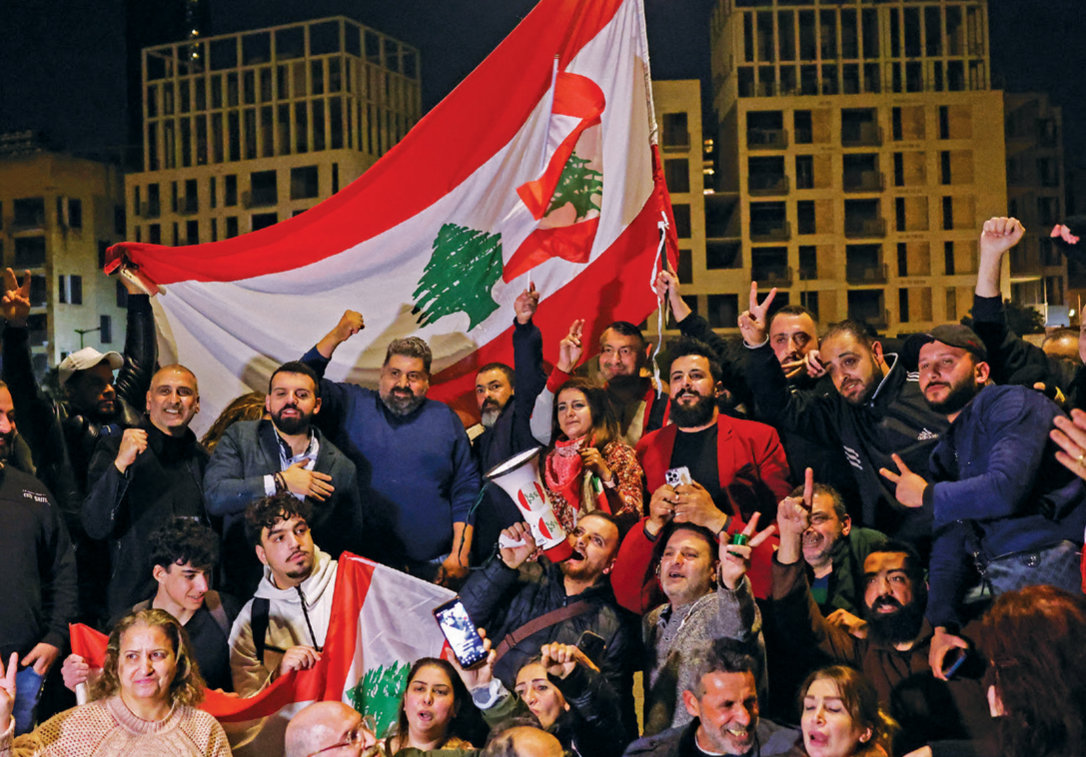
Lebanese people gather at Martyrs' Square in Beirut on January 13, 2025, in support of the nomination of former ICJ judge Nawaf Salam as prime minister of Lebanon. (AFP)
The choice of Salam also underscored the significant shift that has taken place in the balance of power among Lebanon’s sectarian factions in which the Iran-backed Hezbollah militia had long held sway.
Lawmakers from Hezbollah and its Shiite ally, the Amal Movement, failed to rally behind Mikati or delay the consultative process, which could have disrupted Salam’s designation.
In past years, Hezbollah has repeatedly blocked Salam from becoming prime minister, casting him as a US-backed candidate.
His appointment over Mikati, who is backed by the Hezbollah-led alliance, reflected the militia’s declining influence following its recent pummeling by Israel and the toppling of its Syrian regime ally Bashar Assad in December.
Hezbollah and Amal’s decision to abstain, without explicitly naming an alternative candidate, indicated they currently do not intend to participate in Salam’s government.
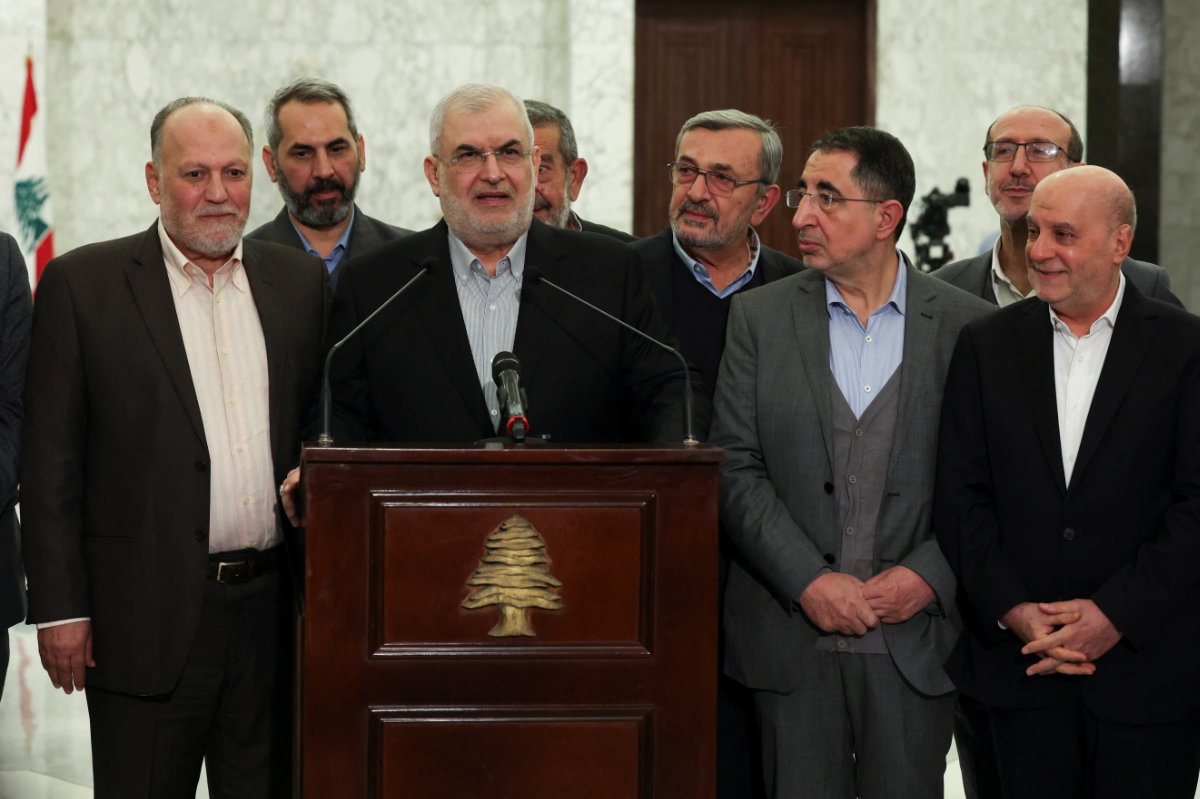
Hezbollah lawmaker Mohammad Raad speaks after meeting with Lebanese President Joseph Aoun at the presidential palace in Baabda, Lebanon, on January 13, 2025. (REUTERS)
Salam won the backing of Christian and Druze factions, as well as prominent Sunni MPs, including Hezbollah allies and opponents who have long demanded the militant group give up its powerful arsenal, arguing it has undermined the state.
In a surprising turn, the Lebanese Forces announced their decision to withdraw the nomination of MP Fouad Makhzoumi for prime minister-designate and back Salam instead.
Signaling his satisfaction with the decision, Makhzoumi said: “Having multiple opposition candidates will inevitably lead to everyone losing.”
Salam’s prospects were further strengthened by the withdrawal of MP Ibrahim Mneimneh, who cited the need for consensus to address Lebanon’s many challenges during what he called a “foundational and transitional” phase.
In another unexpected development, Free Patriotic Movement leader Gebran Bassil declared his support for Salam’s nomination as prime minister.
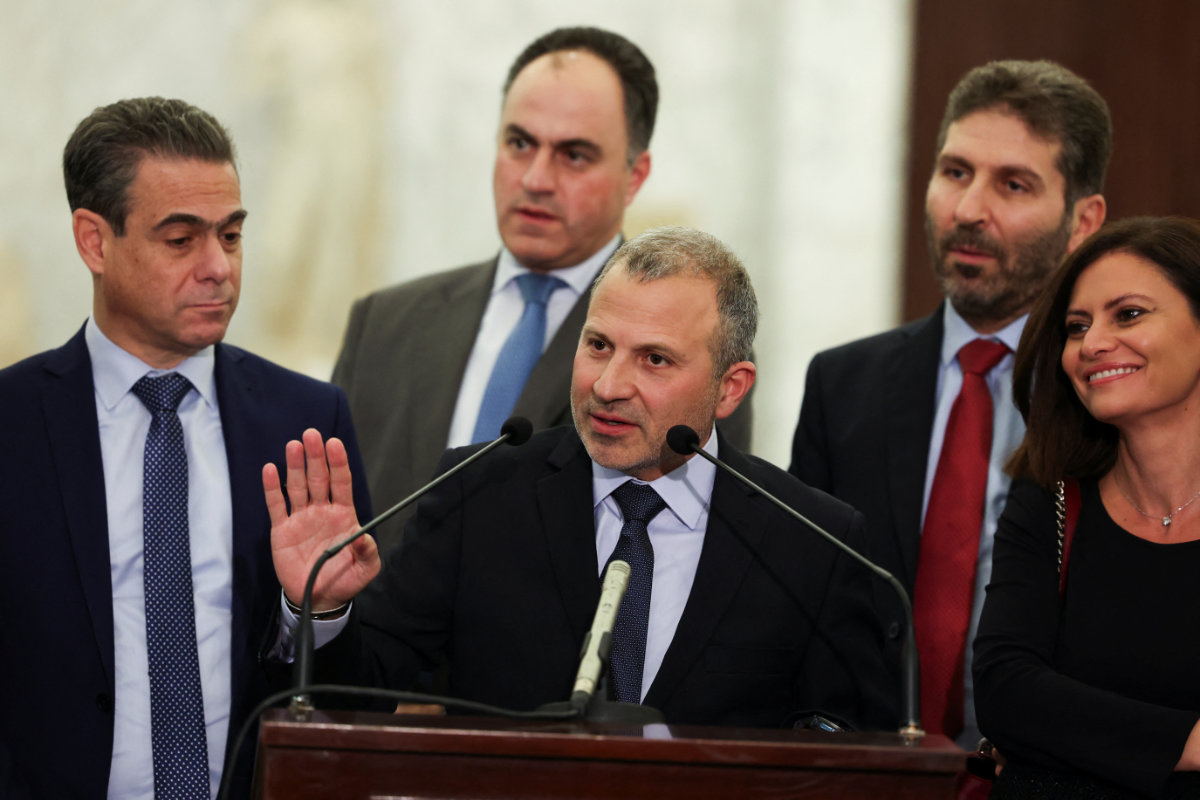
Gebran Bassil, leader of the Christian party Free Patriotic Movement, speaks after meeting with Lebanese President Joseph Aoun at the presidential palace in Baabda, Lebanon, on January 13, 2025. (REUTERS)
Sunni MPs, the Kataeb party’s bloc, the Renewal Bloc, Change MPs and several independents initially supportive of Makhzoumi and Mneimneh, shifted their votes to Salam.
Salam’s background in law and diplomacy has bolstered his image as a figure of professionalism and integrity, resonating well with widespread calls for reform.
The prime minister-designate holds a doctorate in political science from France’s prestigious Sciences Po university as well as a doctorate in history from the Sorbonne. He also has a Master of Laws degree from Harvard Law School.
Salam hails from a prominent Sunni family from Beirut. His late paternal uncle, Saeb Salam, was one of the Lebanese leaders who fought for the country’s independence from France and later served as prime minister four times between 1952 and 1973.
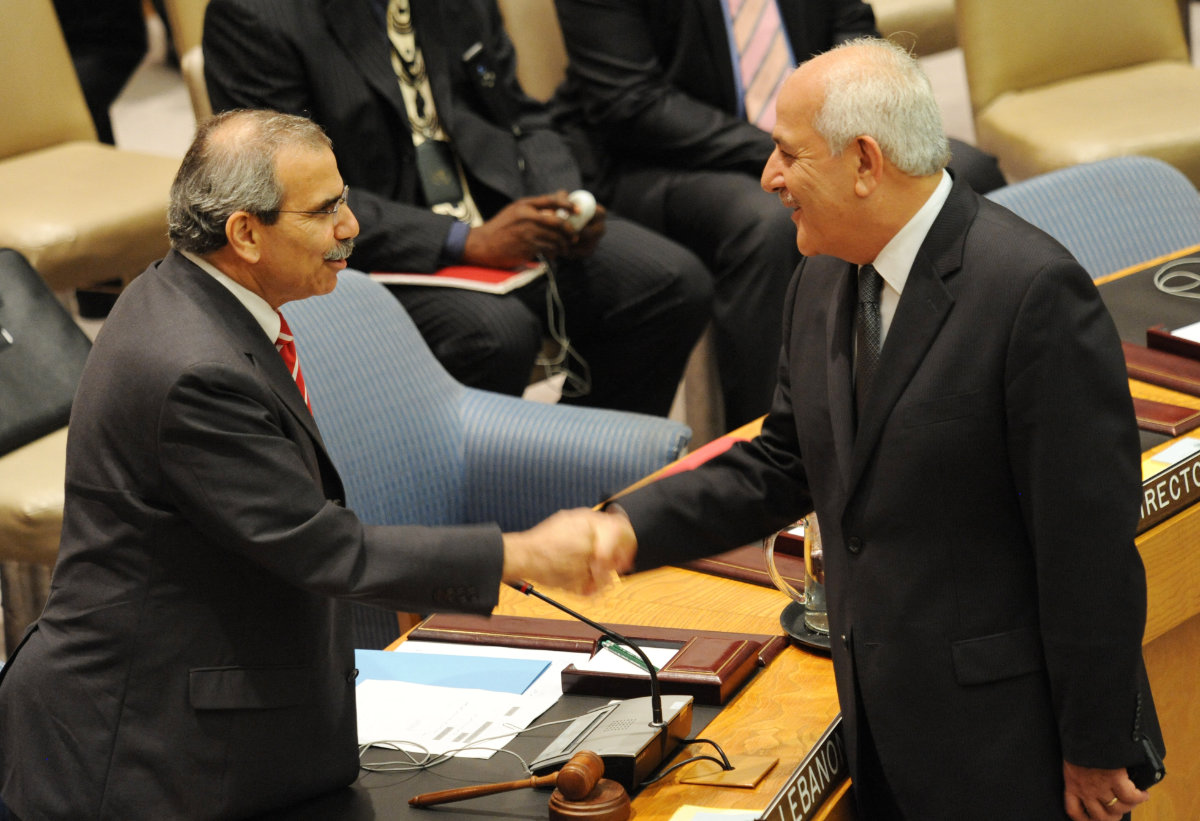
This photo taken on September 28, 2011, shows Nawaf Salam (L), Lebanon's ambassador to the UN, with Riyad Mansour (R), Palestine ambassador to the UN, ahead of a UN Security Council meeting on the Palestinian request for full United Nations membership. (AFP file)
His cousin, Tammam Salam, also served as prime minister for two years in 2014-16.
Salam’s father, Abdullah Salim Salam, was the founder of Lebanon’s national airline, while his grandfather, Abi Salam, served as mayor and deputy of Beirut during the Ottoman era and was a leading advocate for reform.
Salam began his career in 1984 as a lawyer in several Lebanese courts, serving as a legal adviser to several local legal bodies and as a legal representative for international organizations until 2007.
In parallel, he pursued an academic path starting in 1979 as a lecturer at the Sorbonne, specializing in the modern history of the Middle East.
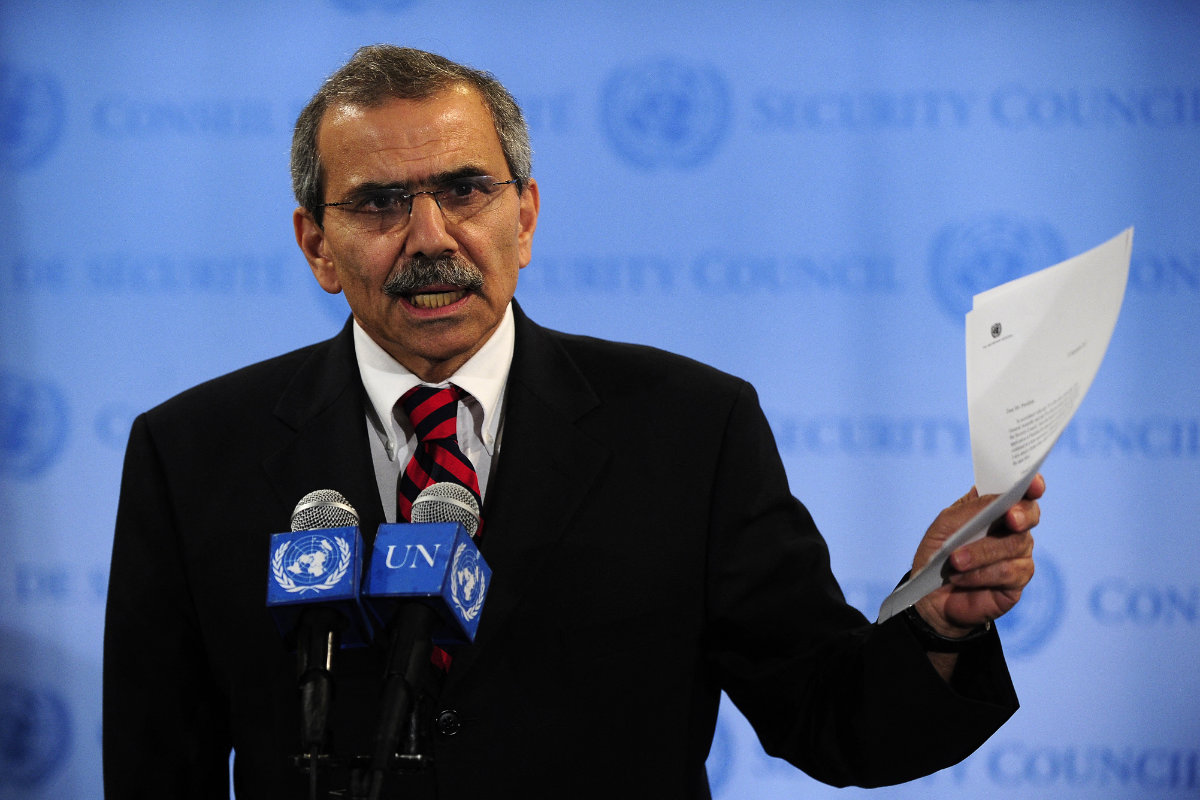
In this photo taken on September 23, 2011, then Lebanese Ambassador to UN Nawaf Salam is shown acknowledging that he received, as head of the Security Council, a formal request from Palestinian Authority President Mahmoud Abbas for the state of Palestine to become a full member of the UN. (AFP file)
He later became a visiting fellow at Harvard University’s Weatherhead Center for International Affairs and a lecturer at the American University of Beirut where he taught international law and relations, served as a visiting professor and associate professor in political science, and rose to become the head of the Department of Political Studies and Public Administration in 2007.
Salam is also an accomplished author, with contributions in law, international law, history, and political science.
In 2007, he was named Lebanon’s permanent representative to the UN in New York, where he served for 10 years. During his tenure, Salam presided over the 67th session of the UN Security Council and served as vice president of the General Assembly until 2013, where he became an advocate for Lebanon’s vital interests and broader Arab and international issues.
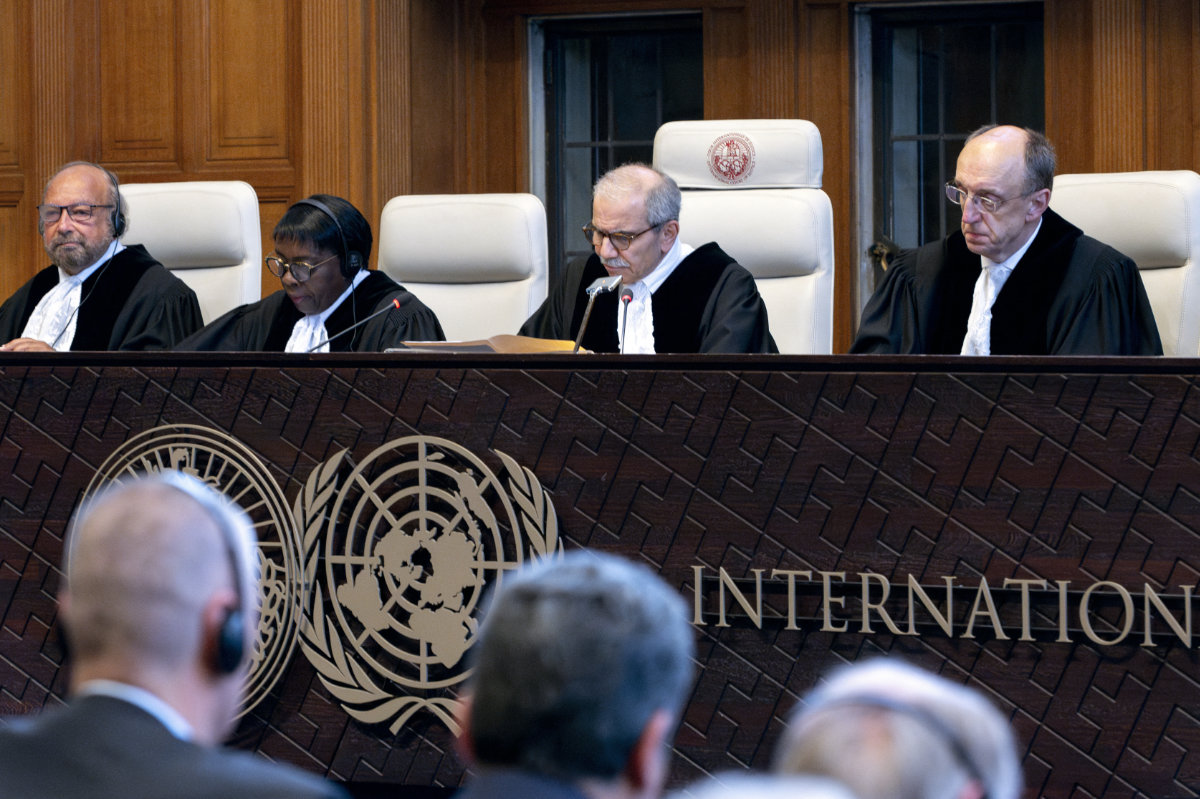
In this photo taken on July 19, 2024, Nawaf Salam 2nd R), judge and president of the International Court of Justice, delivers a non-binding ruling on the legal consequences of the Israeli occupation of the West Bank and East Jerusalem at the ICJ in The Hague. (AFP)
In 2018, Salam became a judge at the ICJ and, in February last year, was elected president of the court, becoming the first Lebanese citizen to hold the post.
He took over the court’s presidency as it held its first hearing in 2024 on a case filed by South Africa accusing Israel of genocide in Gaza, which Israel has dismissed as baseless. He is set to be replaced by Ugandan judge Julia Sebutinde, who will now oversee the case.
During his tenure at the ICJ, Salam issued a historic advisory opinion condemning the Israeli occupation of Palestinian territories and called for the halt of the expansion of Jewish settlements in the West Bank.
Earlier, Salam played a significant role in electoral reform during his three-year tenure as a member of the executive office of Lebanon’s Economic and Social Council and as a rapporteur in the National Commission for Electoral Law Reform until 2005.
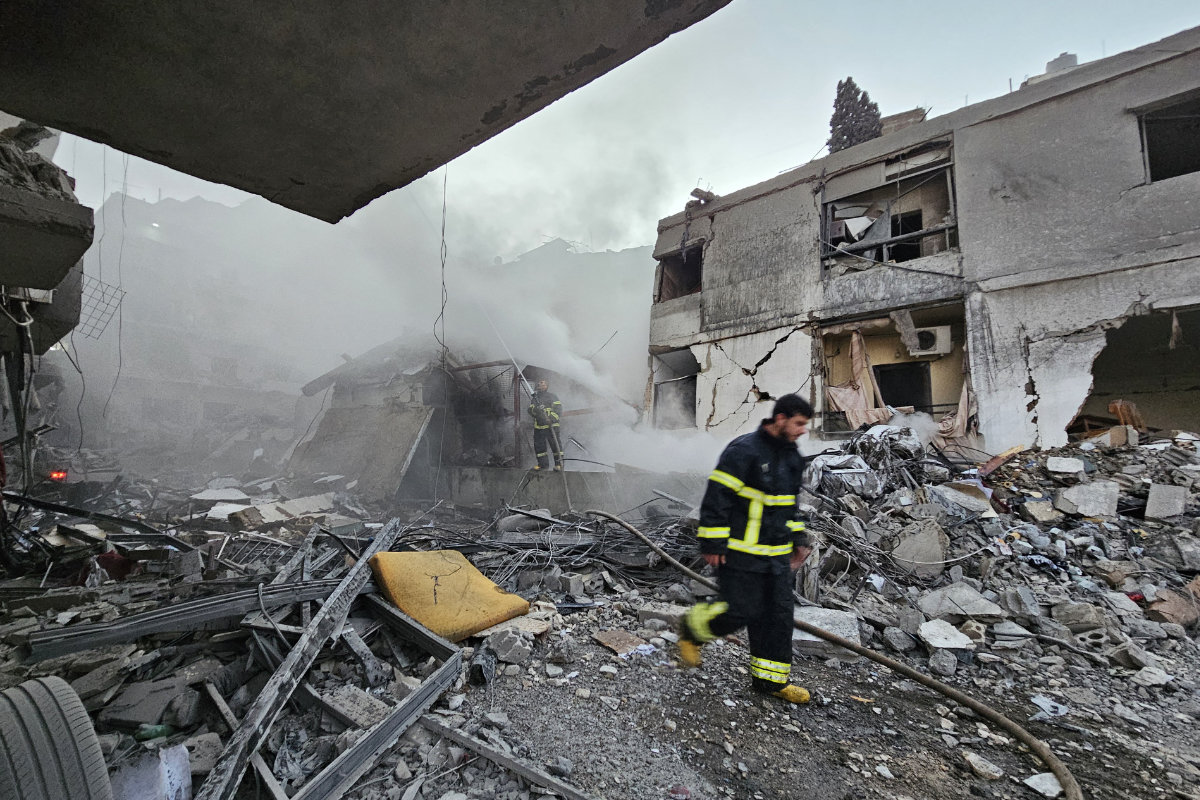
Lebanon's new Prime Minister Nawaf Salam faces the challenge of rebuilding areas damaged by Israeli airstrikes during its war with Hezbollah. (AFP)
Salam now faces one of the biggest challenges of his career as he begins consultations with MPs to form a new cabinet.
Lebanese political leaders and President Aoun, in his inaugural address, have emphasized that the new government must be built on national unity to address the urgent needs of the Lebanese people and navigate the country’s dire economic, social, and political crises.
Rebuilding areas damaged by Israeli airstrikes during its war with Hezbollah and implementing reforms to satisfy international donors amid the country’s worst economic crisis in its history are the top priorities ahead of Salam.

Another key challenge facing PM Nawaf Salam is the disarmament of the Hezbollah militia, whose war with Israel has brought about massive deaths and destruction to Lebanon. (AFP photo)
One of the most sensitive tasks is the disarmament of Hezbollah, consolidating all weapons under state institutions in accordance with national laws and as pledged by Aoun in his inaugural address.
Salam’s government will need to craft new political understandings to redefine Lebanon’s approach to Hezbollah. This includes guiding the militia’s transition from its historical reliance on Iranian and Syrian ties to a framework that prioritizes national interests.
Deploying the Lebanese army to reclaim full sovereignty over national borders and to secure the return of territories occupied by Israel — particularly those seized during the recent conflict — will be critical.
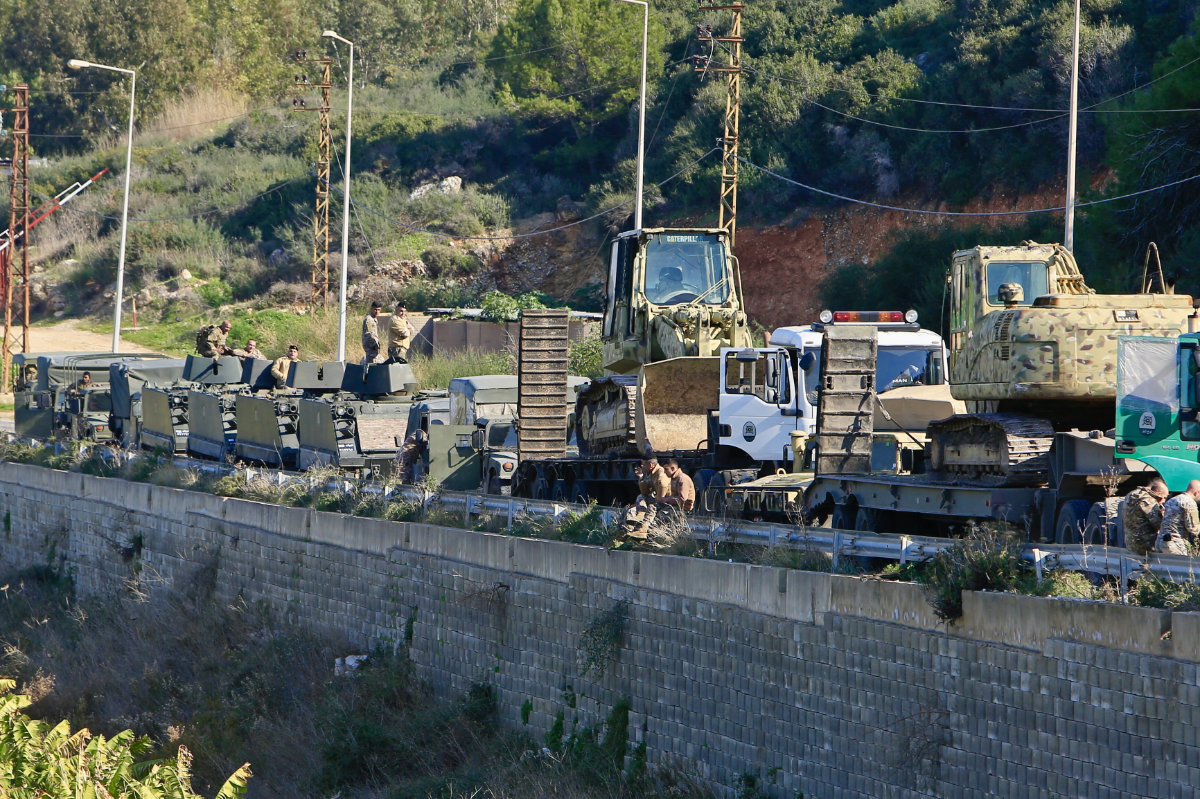
A convoy of Lebanese army military vehicles is seen entering the southern Lebanese coastal town of Naqura, on the border with Israel on January 7, 2025, after Israel's withdrawal from the area as part of the ceasefire agreement between the two countries. (AFP)
These efforts will involve leveraging regional and international support to implement UN Resolution 1701, which mandates an end to hostilities with Israel under international law.
Salam’s appointment has already garnered widespread backing, particularly from Saudi Arabia, alongside other Arab nations, Western allies, the Arab League, and the UN, which have expressed their commitment to Lebanon’s democratic process and the incoming government.
Shortly after the announcement of the new prime minister, Mikati called Salam to congratulate him and wish him success in his mission to form a new administration.
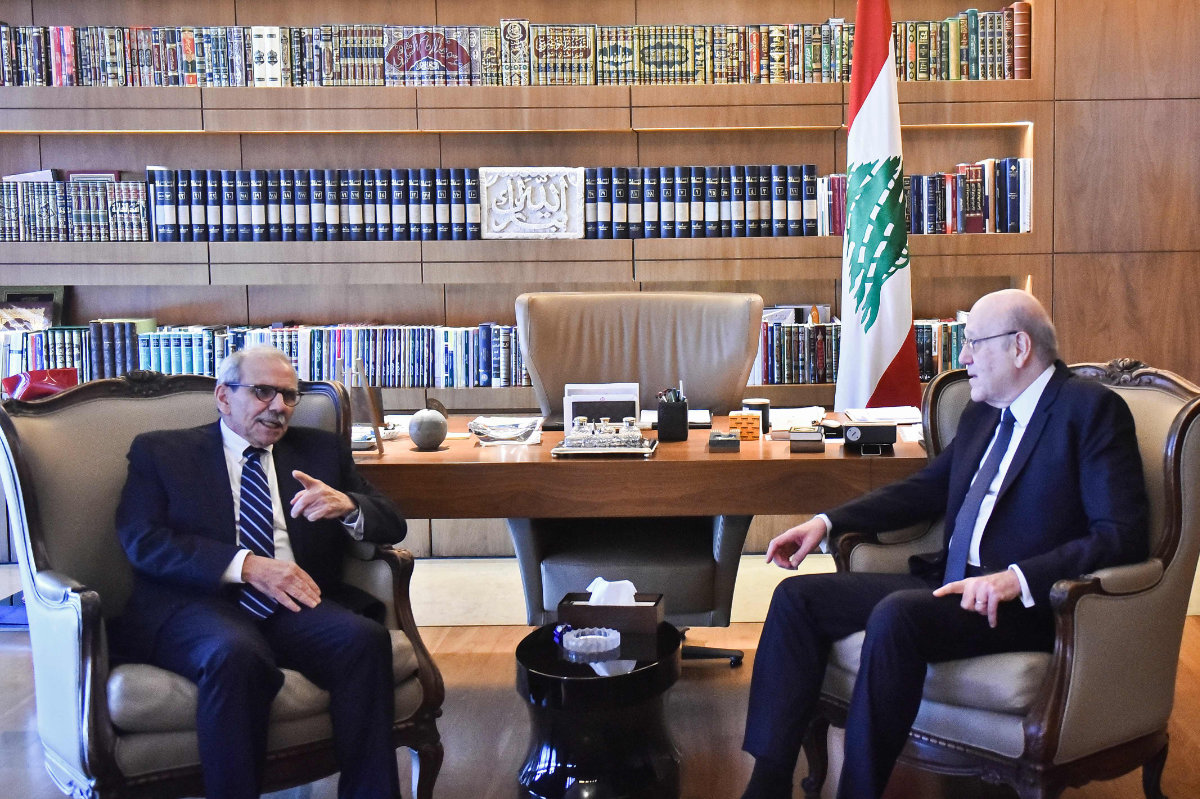
Lebanon's new Prime Minister Nawaf Salam (L) speaks with the country's outgoing Prime Minister Najib Mikati during their meeting in Beirut on January 14, 2025.(AFP)
Mikati said his caretaker government, which navigated Lebanon during a tumultuous period, had laid the foundations for postwar recovery through issuing draft laws ready for parliamentary approval and preparing reform projects.
He stressed the need for unity and consensus to lead the next phase for Lebanon.
“Past experiences have shown that there is no alternative to consensus and that an approach of defiance has cost us many opportunities for recovery,” Mikati said. “The challenges we face are undoubtedly great, but the will of our people is stronger.”
Congratulating Salam, EU Ambassador to Lebanon Sandra De Waele called for a swift government formation to launch much-needed reforms and revive state institutions.
The regional and international backing for Salam’s designation is likely to lead to a flow of funds from Western and Arab nations, crucial in helping his new cabinet in the reconstruction process and Lebanon’s recovery.
